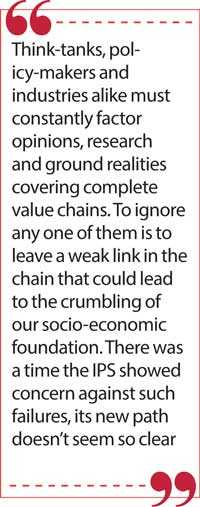Friday Feb 20, 2026
Friday Feb 20, 2026
Friday, 13 November 2020 00:00 - - {{hitsCtrl.values.hits}}

The IPS claims it still works with Government, private sector, development partners, civil society and academia, but it is increasingly apparent that priority is given to sponsors – possibly listed under development partners
By Patrick De Silva
The recent weeks saw a spate of articles concerning tobacco control, with some viewpoints calling for higher prices to control sales. Whilst there has been acceptable debate on media with respect to the efficacy of such controls, the notable bias and frequency of material published by the Institute of Policy Studies (IPS) propositioning further hikes raises sombre concerns.
To provide context, the IPS is established by an Act of Parliament and was supported by the Royal  Netherlands Government and the Sri Lankan Government, with room to diversify its income. IPS states it has now established its own endowment fund and full independence, and herein lies the problem.
Netherlands Government and the Sri Lankan Government, with room to diversify its income. IPS states it has now established its own endowment fund and full independence, and herein lies the problem.
The IPS was once a much respected and sought after think-tank. Under the stewardship of its late Executive Director, Dr. Saman Kelegama, it lent balanced profound advice to Government, industries and organisations factoring global and local trends, learning and policies.
A market study commissioned in 2010 by a large multinational to IPS produced very balanced recommendations factoring revenue, regulations, manufacturers, consumer interests and global trends. It did not merely follow the brief of its sponsor. That balance has since been lost and IPS now resorts to toeing the line of major sponsors and this becomes apparent through its assertions on the tobacco trade.
Compromised positions
Think-tanks are key to shaping public policy through evidence-based research and engagement that encapsulates every stakeholder group and market certainties. When an agency begins to thrust a singular point of view that eschews all stakeholder groups, it ceases to become a think tank and declines to a mere mouthpiece. This is what befell the IPS and the evidence has surfaced as below.
The IPS claims it still works with Government, private sector, development partners, civil society and academia, but it is increasingly apparent that priority is given to sponsors – possibly listed under development partners.
The lure of funding
The initial evidence comes from the website of the Royal Society of Arts, which boldly states in its introduction to a recent article: “With an innovative mix of money, support and advice an RSA inspired project is strengthening two think tanks – in Nepal and Sri Lanka – to make life that little bit harder for big tobacco companies.”
The role of a think tank is to provoke constructive process of thought, recommendations and deliberation on balanced policies to drive an economy, industry and a nation forward. However, it appears the IPS – in this instance – is mandated to “make life that little bit harder” for identified industries and this is simply what is doing. The IPS’ programme against the tobacco industry is managed by Kivu, part of the RSA, and Cancer Research UK.
“The aim of the programme is for IPS and NDRI (Nepal) to establish themselves as new players in the tobacco policy debates in Sri Lanka and Nepal respectively. Neither has a track record of working in this space and success in a few years’ time would see them become go-to experts on tobacco control, producing influential, policy relevant and high-quality think tank outputs,” the website adds. But to become an effective expert any think tank or policymaker must engage the gamut of industry and its value chain. There is no evidence of IPS having done that here in Sri Lanka.
Balanced approach is critical
Kivu has called for more funding and support for this programme, and naturally the management and finance department at IPS would take good note with glee. A senior researcher at Kivu states that the organisation believes in “using research to influence policy” adding it has first-hand experience in seeking to achieve change in highly political contexts. But what is lacking from these so-called respected research agencies is just that what they claim to do.
Effective research that captures the viewpoints and considerations of all stakeholders. None of the reports published by IPS in the case of the tobacco industry points to such balanced research. It is merely following the prejudiced positions of its sponsors. Such a flawed process cannot lead to the drafting of sound economic and public policy be it for the tobacco industry or any other.
For countries such as Sri Lanka that sit at a crucial juncture on its development journey, policy-makers and leadership must take note not to fall prey to the whims of local and foreign agents focused simply on selfish gains.
Think-tanks, policy-makers and industries alike must constantly factor opinions, research and ground realities covering complete value chains. To ignore any one of them is to leave a weak link in the chain that could lead to the crumbling of our socio-economic foundation. There was a time the IPS showed concern against such failures, its new path doesn’t seem so clear.
(The writer is an Attorney-at-Law and serves as a consultant to leading agronomic institutions in Sri Lanka and Australia with over four decades of experience. He can be reached at [email protected])